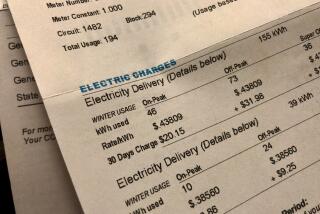The High Costs of Cable
- Share via
In this time of low inflation, when prices for practically everything are holding or falling, why are cable TV rates up an outrageous 8.5% in a year? The increase, nearly four times the rate of inflation, startled even the Federal Communications Commission, which oversees rates.
The numbers and other data in a new FCC report make it clear that new competition from satellite dishes and telephone companies, which was supposed to bring down cable rates, is not doing the job. And, since each locality assigns its cable franchise to only one operator, the companies act as virtual monopolies in local markets. What exists is not a free market and is not competitive by any stretch of the imagination.
The 1996 Telecommunications Act assumed that by allowing telephone companies, electrical utilities, satellite services and others to offer subscription video services, plenty of competition would develop. Clearly that is not happening.
The rate hikes and the current drift toward concentration of cable ownership are good reasons to delay a scheduled final deregulation of the cable industry next year. It is also urgent that the FCC temporarily freeze cable rates while the agency thoroughly examines how cable operators have been determining their rates. Cable rates also deserve a thorough airing at next month’s congressional hearings on the 1996 Telecommunication Act’s failure to spur competition.
The FCC report said cable rates rose 8.5% in the 12 months ended last July, bringing standard service, without premium channels, to an average $28.83 a month. The consumer price index rose 2.2% during that same period. Cable operators claim they had to offset rising programming costs and infrastructure spending. But the monthly fee increases alone generated an additional $1.5 billion in new revenue over the previous year. Advertising revenue rose about $300 million. How much could programming and other costs have risen? And how are such costs and their amortization calculated? This is something that regulators need to know.
Cable TV rates have come under federal review before, under similar circumstances. Until 1984, rates were fully regulated at the local level. Two years later, cable rates were totally deregulated. But when rates zoomed up 60% between 1984 and 1992, three times the rate of inflation then, Washington intervened and subjected cable operators to new regulation. The FCC studied rates and developed a formula to evaluate basic rate setting at the local level. In 1994, the FCC ordered rate rollbacks that averaged 17% nationwide.
Chairman William E. Kennard has ordered the FCC to study the correlation between the rise in programming costs and cable rates. The agency can freeze or roll back rates, change rules to make it difficult to pass on program costs or allow cable rates to rise only in relation to inflation. It is unlikely that Congress will revisit the Telecommunications Act in this election year, but it can use the threat of extending the FCC’s authority over cable rates beyond March of 1999. If cable companies don’t respond to the outcry over spiraling rates, the FCC should not hesitate to use its regulatory power over a “free market” rate system that isn’t.
More to Read
The biggest entertainment stories
Get our big stories about Hollywood, film, television, music, arts, culture and more right in your inbox as soon as they publish.
You may occasionally receive promotional content from the Los Angeles Times.










